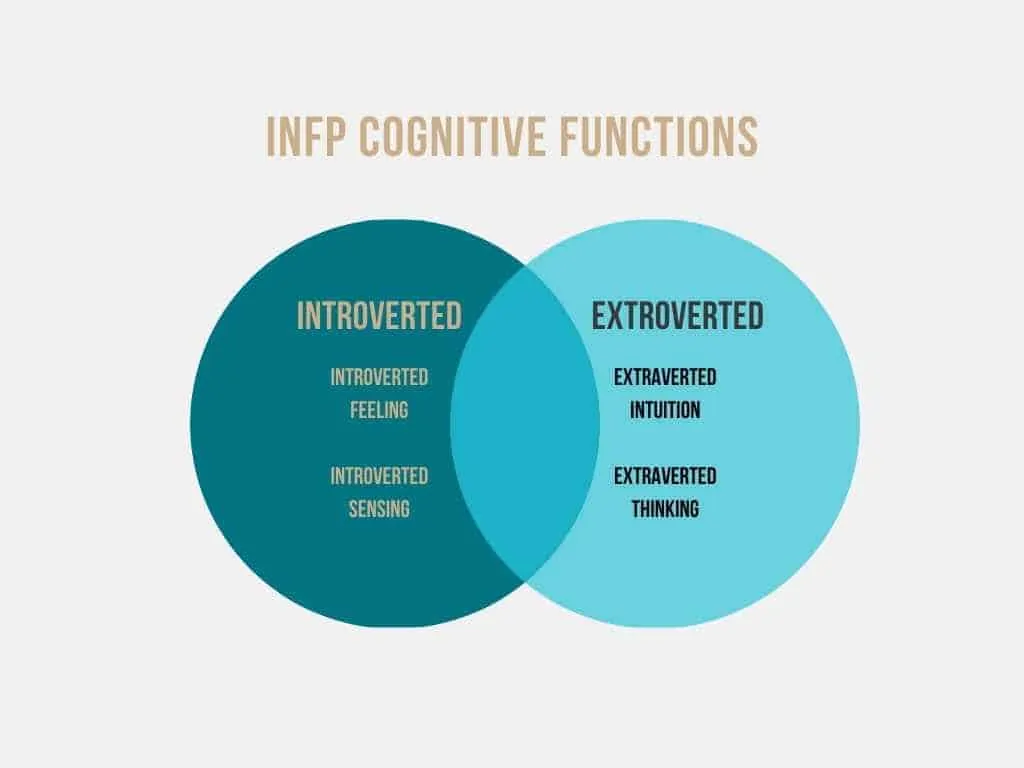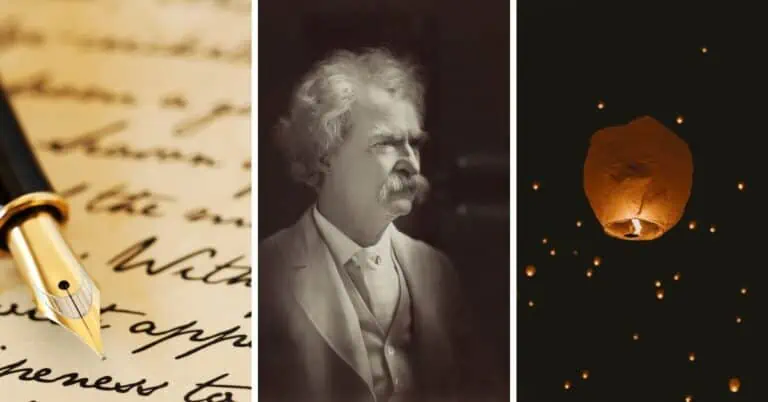The Extroverted Side of Every Myers-Briggs® Personality Type
Carl Jung once said, “There is no such thing as a pure introvert or extrovert. Such a person would be in the lunatic asylum.” As the founder of psychological type, the fact that he said this is very significant. And it’s true, as well. Everyone has an introverted side, and everyone has an extroverted side. Today we’re going to explore the extroverted side of each type, and how you can recognize it in daily life.
Read This First!
Each personality type in the Myers-Briggs system has introverted and extroverted functions. If you’ve ever felt like an “ambivert” this is why! Nobody was meant to focus only on the inner world – we all need input from the world around us. Nobody was meant to only focus on the external world – we all need input from the thoughts and reflections inside us! In this article, we’re going to explore the extroverted functions, but in two weeks we’ll be looking at the introverted side of each Myers-Briggs personality type. You can see an example of our introverted and extroverted sides in the graphic below for the INFP personality type:

Not sure what your personality type is? Take our new personality questionnaire here. Or you can take the official MBTI® here.
The Extroverted Side of Each Myers-Briggs® Personality Type
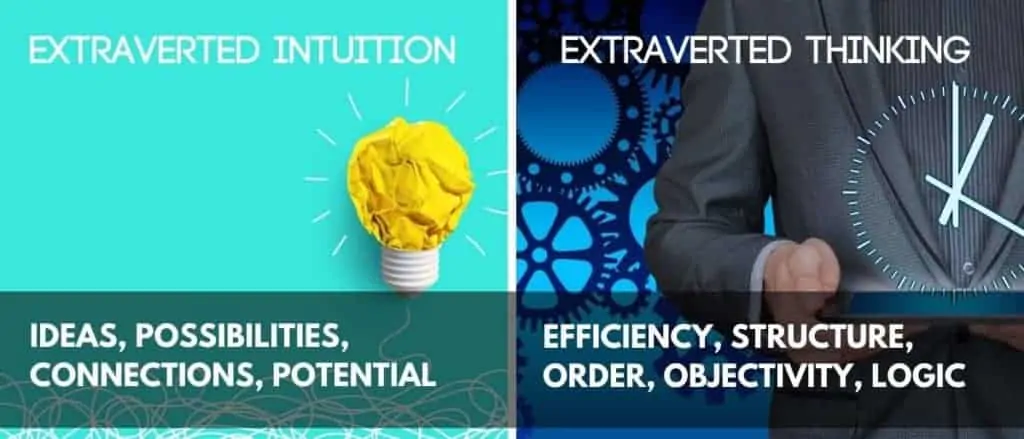
The ENFP – Extraverted Intuition and Extraverted Thinking
You are an explorer of ideas, possibilities, and connections. Your extraverted intuition enables you to see transformations and potential in the world around you. You enjoy bringing up ideas and potential with other people. Swapping ideas with other people, brainstorming, and working with others on creative projects all bring out your extroverted, explorer side.
You also have a thinking side to your personality, but it’s not the “leading star” in your life. As your tertiary function, Extraverted Thinking shows up intermittently and with wavering strength. When you buckle down and organize a project you’ve been putting off for too long, that’s when Extraverted Thinking takes the wheel. It’s the goal-focused, decisive, make-things-happen side of your personality that isn’t afraid to call the shots or be blunt for the sake of efficiency. There are a lot of times when you stifle this side of your personality, choosing to lean on your intuitive and feeling sides instead. But the older and more mature you get the more powerful and influential this function becomes.
The INFP – Extraverted Intuition and Extraverted Thinking
As an introvert, your extroverted side is more subtle than it would be if you were an extrovert (you’re probably thinking “Well, duh, obviously!”). With Extraverted Intuition as your auxiliary function, you balance the inner perceptions of your feeling side with an explorer, seeker quality in the outside world. You enjoy exploring ideas and possibilities with others in a relaxed setting. When you’re having coffee with a close friend, for example, you might enjoy discussing philosophical matters, theories, or concepts that trigger ideas in your mind. You can be gifted at brainstorming, thinking outside the box, and generating alternatives for people. You can become surprisingly invigorated and talkative when you can go into detail about things you’ve been imagining or novel opportunities you want to explore. But afterward, you’re likely to feel exhausted – no matter how fun the conversation was.
Extraverted Thinking is your inferior function, so this side of yourself is one that you tend to stifle and repress more than the Intuitive or Feeling sides of your personality. Extraverted Thinking is the part of you that desperately wants to get things in order, segmented, and planned out. It’s the side of you that gets frustrated by inefficiency and disorder but doesn’t feel strong enough to whip everything into shape. Extraverted Thinking can also come out when you’re stressed. Suddenly all the disorganized pieces of your life seem to be crowding in on you and you feel like you’re drowning in your own or others’ incompetence. You can become uncharacteristically critical and outspoken during these times. You might frantically try to get everything in your life organized, finish projects, and speak out against illogical or inefficient people around you.
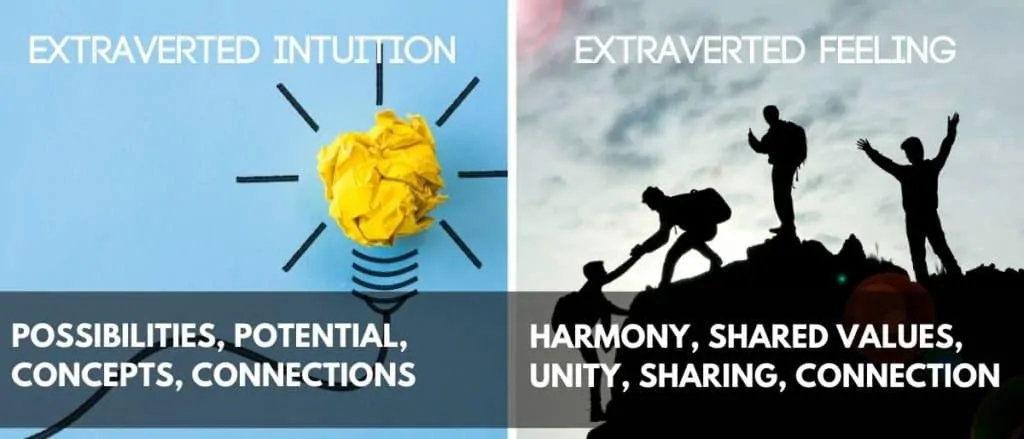
The ENTP – Extraverted Intuition and Extraverted Feeling
Like the ENFP, you also are an explorer of ideas and possibilities. You enjoy brainstorming with others and inspiring them with possibilities and angles they’ve never seen before. Sometimes this can take on the form of a debate, playing devil’s advocate by showing an alternate side to the coin that another person has never considered before. You enjoy generating original ideas and opportunities for your future, and you love getting others on board with your ideas. You exude restless intellectual energy to the world around you and inspire people to pursue ventures they would never have considered otherwise.
You also have a feeling side to your personality, but it’s not in the “driver’s seat” of your personality. As your tertiary function, Extraverted Feeling gives you a unique ability to “read” people and sense the overall vibe of the room you’re in. You can sense emotional tension, intensity, or lack thereof and you’re pretty gifted at rubbing shoulders with people and creating a particular mood. You like being in a positive emotional atmosphere and getting positive feedback from other people. At the same time, you might enjoy debating people or saying certain things just to create some excitement or intensity. If things get too tense or awkward, you usually know just the right joke to crack to release some of the rigidity and tension.
The INTP – Extraverted Intuition and Extraverted Feeling
You have the same extraverted functions as the ENTP, but they’re going to be more muted because of your introverted nature. With Extraverted Intuition in the auxiliary position, you consider yourself a theorist and explorer of ideas and possibilities. You enjoy exploring and debating intellectual possibilities with people. You become outspoken and enthusiastic when you get a chance to play devil’s advocate to a position you feel hasn’t been thoroughly researched or considered. You can easily generate a dozen alternatives or possibilities in situations where others might feel stuck or paralyzed.
Extraverted Feeling is your inferior function, so this side of your personality tends to be more unconscious and vulnerable than your intuitive or thinking sides. It’s the side of you that wants approval, affirmation, and positive emotional interactions. It’s the side of you that knows what’s socially appropriate and gets shy when you make a social faux pas. Sometimes you choose to listen to this side of yourself and sometimes you choose to ignore it. But it’s there in the background wanting to be heard. When you’re severely stressed, the feeling side of your personality can take over and you may find yourself being uncharacteristically emotional, hypersensitive, and in need of positive feedback from others. You might reach out to friends more, unexpectedly vent all your feelings to someone, or even write your feelings in a poetic form. You feel a compulsion to get your feelings out into the world in some way – either verbally or in writing or in an art form.
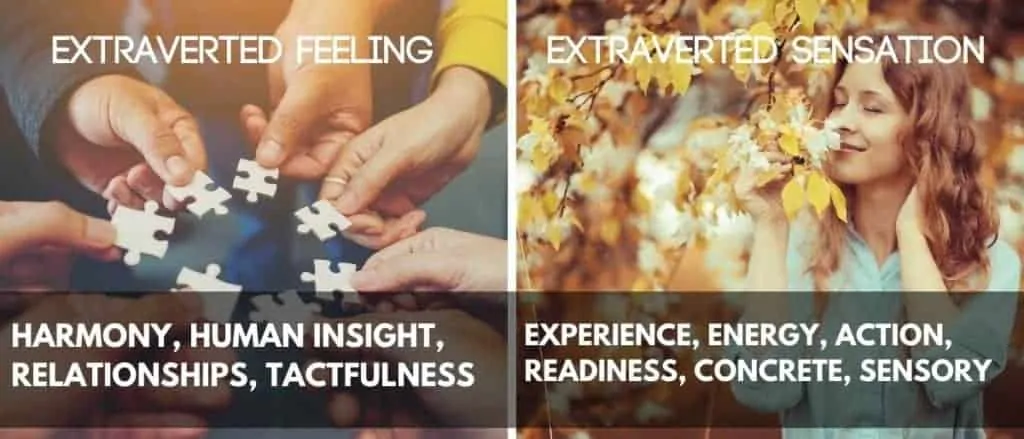
The ENFJ – Extraverted Feeling and Extraverted Sensation
You are someone who gravitates towards emotional connection and a raw, authentic sharing of ideas and feelings. As an Extraverted Feeling dominant type, you can quickly sense the emotional needs and feelings of the people around you. You enjoy exploring feelings, relationships, and concepts with people and sensing an authentic connection and sense of rapport building. You like making people feel comfortable by relating to them and finding shared values and interests. You enjoy when people confide in you and you enjoy confiding in others that you trust. Life is about connection and you consider yourself a connection-creator.
The Extraverted Sensation part of your personality isn’t the “driver” of who you are, but it does play an integral part of who you are. It’s the side of you that wants you to trust your impulses, pursue adventures, and engage in real-world experiences, embracing the moment for what it is. It’s the part of you that wants to “seize the day” and notice everything around you in all its detail. Many times you might get distracted from this side of your personality type by focusing on your feeling or intuitive sides. You tend to anticipate and plan rather than just act spontaneously. But when this side does show up it’s usually fun and stress-relieving for you.
The INFJ – Extraverted Feeling and Extraverted Sensation
Your extroverted side shows up when you’re around people and want to form authentic connections with them. You want the people around you to feel comfortable and accepted. Because of this, you might avoid awkward silences, seek out outliers in the room who might look lonely or make self-deprecating jokes to put other people at ease, and encourage authenticity. Factors like shyness or social anxiety can make an impact on this. Yet because you have this Extraverted Feeling side, you want to share your feelings with someone, in fact, you tend to sort out your feelings by externalizing them (writing them down or speaking them).
Your inferior function is Extraverted Sensation (Se). Because it’s your inferior function, it is far less conscious than your intuitive or feeling sides. You may try to repress this function or keep it down. But no matter how hard you try, there’s a little voice inside you that wants adventure, excitement, and novel experiences. You want to try new things, go to new places, or maybe just listen to music or dance or sing at the top of your lungs. You might let out this extraverted side in small spurts, but for the most part, you keep it buried until you’re extremely stressed. Then suddenly and uncharacteristically you might become impulsive, reckless, or fixated on intense experiences (like over-exercising, eating too much, or spending too much). You can find out more about this in Understanding INFJ Grip Stress.
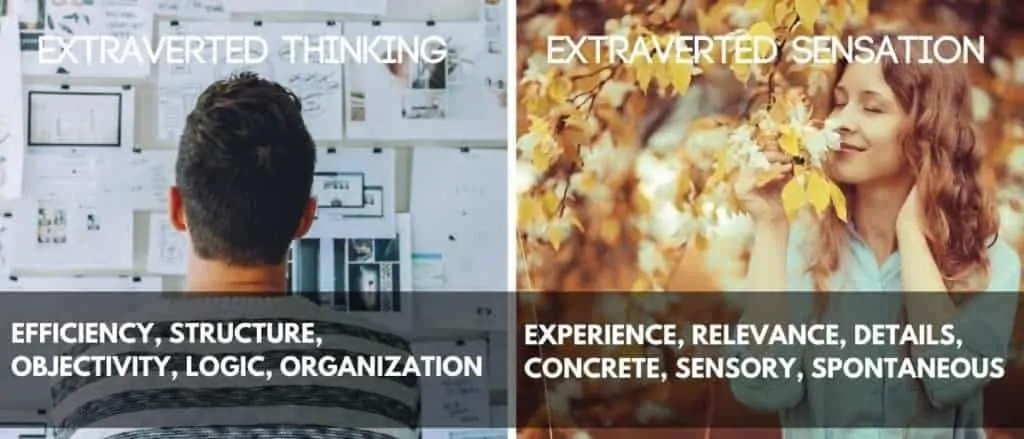
The ENTJ – Extraverted Thinking and Extraverted Sensation
Your extroverted side shows up in an eagerness to accomplish tasks, organize the world, and get things done. You like working with people towards goals and objectives, making plans come together, and segmenting tasks in a streamlined, effective way. You can have a commanding presence if things are being run poorly – taking charge and fixing kinks in the process that are slowing things down. You enjoy solving problems with people, thinking out loud, and troubleshooting.
The Extraverted Sensation part of your personality isn’t the one in charge – it’s more like the rowdy teenager that wants to have a good time. For you, Extraverted Sensation helps you stay focused on the details and realities of the moment you’re in. It also gives you an impulsive, restless streak that wants adventure, novel experiences, and calculated risks. You’re not too afraid of trying new things, and part of that is thanks to your tertiary Extraverted Sensing side.
The INTJ – Extraverted Thinking and Extraverted Sensation
Your extroverted side shows up in your goals and objectives. You have a knack for organizing your tasks and systematizing them in an efficient way. Delegating to people, organizing them, and verbalizing courses of action is a skill that you tend to develop in your teens and 20s. You might even think out loud to work out decisions and come up with the most logical plans. Troubleshooting with others and giving advice tends to come naturally. When there’s a problem that needs to be solved, you’re likely to speak up and let people know the most logical, efficient way to handle it.
As with the INFJ, your Extraverted Sensing side is inferior. You tend to only let it out in small bursts. It’s a little impulsive voice that wants action, experience, and spontaneity. You tend to shove this side of yourself down in favor of your intuitive and thinking sides. You’re more likely to be someone with a plan than someone who spontaneously does whatever seems good at the moment. But when you’re stressed, Extraverted Sensation can rear its head in recklessness, impulsivity, or simply an intense focus on sensory experience (like over-cleaning, over-exercising, or listening to really loud music).

The ESFP – Extraverted Sensation and Extraverted Thinking
You’re an Extraverted-Sensing dominant personality type. This means that you have an incredible eye for detail and an ability to react quickly to incoming stimuli and information. You see things for what they are, pride yourself on being a realist, and respond quickly in a crisis. You appreciate vivid colors, sounds, smells, tastes, and textures. You’re energized by living in the moment and immersing yourself in sensory intensity. Because you’re a dominant sensor, you learn practical, hands-on skills quickly and can resourcefully use your surroundings when needed.
Like the ENFP, you also have tertiary Extraverted Thinking. Because it’s tertiary it’s not given the same priority that Sensation and Feeling are. But it’s still a hidden savior in your life. When life gets out of control or you’ve procrastinated too long, your tertiary thinking side kicks into gear and helps you streamline your goals, analyze your problems logically, and organize the world around you efficiently. It’s the part of you that can debate your values logically and put your beliefs into action in the world around you in an effective way.
The ISFP – Extraverted Sensation and Extraverted Thinking
As an introvert, your extroverted tendencies are more under-the-radar than an extroverts would be (I know this probably goes without saying). You can become quite vocal when you’re putting action to your values. For example, if you were helping at a homeless shelter, you would be very actionable, responsive, and involved in relaying the relevant facts and details. You’d be tuned into the environment around you, looking for any practical needs that could be met. In a more day-to-day sense, your extroverted side puts you in touch with the world around you, makes you aware of what’s relevant, and helps you to “read the room.”
Extraverted Thinking is your inferior function. This is a function that you tend to repress in favor of your feeling and sensing sides. Yet no matter how much you may ignore this function, it’s still a small voice that speaks up saying “You need to get your plans in order!” or “Let’s step back and focus on the most logical thing to do.” During moments of extreme stress, this side of you may act up and try to take control of your life. When this happens, you tend to become more outwardly critical, frantic, and focused on hurriedly finishing projects and making things as efficient as possible.
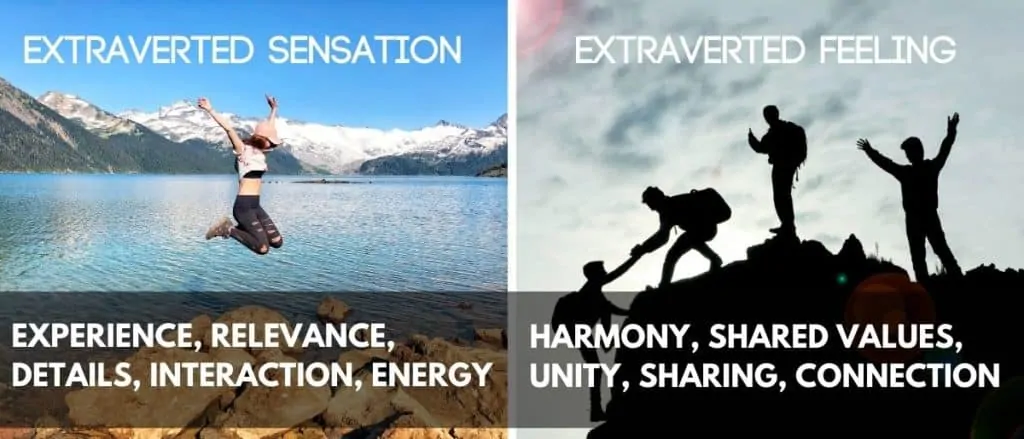
The ESTP – Extraverted Sensation and Extraverted Feeling
Like the ESFP, you’re also an Extraverted Sensing dominant type. You want to touch, taste, and experience all that life has to offer. You enjoy sensory immersion and intensity and have an energetic zest for life. You’re also a realist – you know how to focus on what’s relevant now rather than fixating on what’s happened in the past or what could happen in the future. You’re detail-oriented, practical, and resourceful – easily picking up new hands-on skills.
You also have a feeling side, even though it might surprise you! Your tertiary feeling side helps you to read the room, sense how people are doing emotionally, or even crack the right joke at the right time to diffuse tension. There’s also a part of you that craves affirmation or emotional intensity. You might amp up the atmosphere by pulling pranks, getting people involved in activity, or intensifying the atmosphere, and getting people excited.
The ISTP – Extraverted Sensation and Extraverted Feeling
As some of the most private introverts in the Myers-Briggs system, you tend to have a more subtle display of extraverted qualities. You can be very proactive and in-charge when there’s a problem that needs a fast, tactical solution. Your extraverted sensation side shows up in an ability to relay details, make things happen quickly, and gather resources in make-or-break situations.
You also have a feeling side that has a powerful but more unconscious side to your personality. You tend to downplay this side of yourself in favor of your thinking or sensing sides. But it’s there just the same. It’s a vulnerable part of your personality; a side that wants connection while the rest of you craves autonomy. A side that can be deeply aware of other people’s feelings, but unsure of whether to trust those insights. During times of intense stress, you may feel uncharacteristically concerned with what other people think of you. You may feel awkward, alienated, and desperately in need of some kind of affirmation or emotional validation. You may do things to try to get attention from others, only to feel increasingly awkward about it (especially after you’ve calmed down). You can find out more about this in How ISTPs Handle Stress.
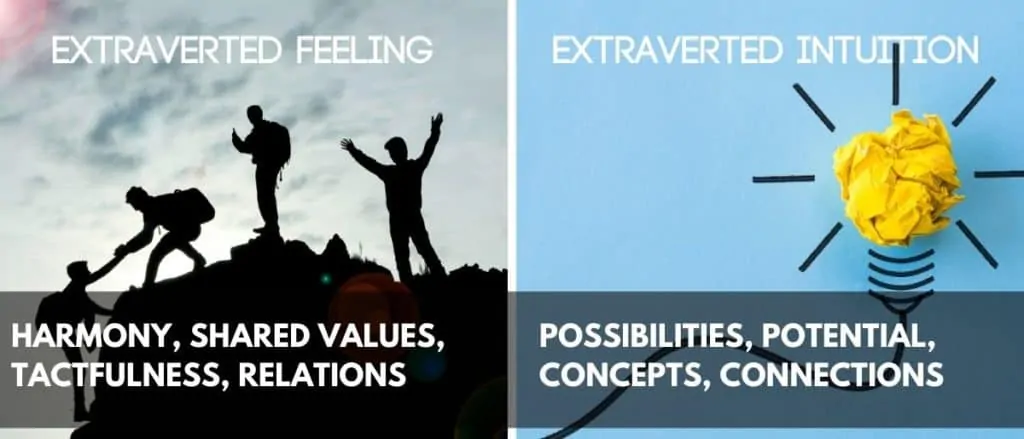
The ESFJ – Extraverted Feeling and Extraverted Intuition
Like the ENFJ, you crave emotional connection and a sense of community. You easily sense other people’s needs and pay attention to shared values and interests. You like exploring relationships, confiding in others, and being confided in. You want to make people feel comfortable, laugh, share memories, and swap life lessons.
Extraverted intuition is your tertiary function, so it takes a back seat to the feeling and sensing sides of your personality. That said, it’s still a voice that beckons you to explore new ideas, alternatives, and possibilities outside of your own experience. You might find yourself getting a thrill from science fiction movies or hypothetical scenarios that come up in conversations with others. You might get a sense of excitement from exploring novel ideas with people. That said, you only tend to enjoy this function in small spurts because you’re going to keep wanting to revert to a sensing place. You can find out more about your Extraverted Intuitive side in our article about the tertiary functions of each type.
The ISFJ – Extraverted Feeling and Extraverted Intuition
Your Extraverted Feeling side shows up when you’re around other people. It’s the side of you that wants to put people at ease, connect with them emotionally, and take care of their needs. It’s the side of you that notices shared values and interests. When you’re with people, you might not seem so introverted because this part of your personality takes the wheel and helps you navigate the social world. You’re naturally interested in warm, harmonious connections with other people and this can make you appear more like an “extroverted introvert” than a pure introvert. That said, you’ll probably feel like you’re in need of a good, long nap after prolonged socialization.
Extraverted intuition is your inferior function, so it tends to be a more unconscious part of your personality. You might feel insecure or nervous when you’re dealing with scenarios that are new and unexpected. Change might feel overwhelming. You might be skeptical of alternatives in a situation where the tried-and-true way seems obvious to you. That said, it’s still a voice inside you that beckons you to try something new, see things from a different angle, or use something around you in a unique way. You might collect trinkets or pieces of nature so that you can create something new or different from them. When you’re severely stressed, this side of your personality can flare up and make your mind create dozens upon dozens of worrying scenarios in your mind. You might feel like you’ve got to change a bunch of things in your life in order to “fix” the things that are worrying you. You can find out more about this in How Each Myers-Briggs® Type Reacts to Stress, and How to Help.

The ESTJ – Extraverted Thinking and Extraverted Intuition
As an Extraverted Thinking type, you enjoy working with teams to accomplish goals and find solutions to problems. You tend to naturally take charge in situations where you see inefficiencies or incompetence. When you’re trying to work through a problem, you like to “think out loud” and get input from others you respect. You can be very gifted at breaking down big, confusing plans into bite-sized, sequential steps and relaying those to people so they know where to begin. This can make you an excellent teacher!
Your Extraverted Intuitive side is less prioritized by you than your thinking or sensing sides, but it’s still vital. This side of you can show up in your offbeat sense of humor, your ability to brainstorm or make creative alterations to projects you’re working on. When you’re relaxed and in a stress-free zone you can tap into this function for small spurts of time and really enjoy it. You might enjoy exploring conceptual ideas in conversation or watching fantasy movies that aren’t based in reality. Having more strength in this function allows you to see more alternatives, angles, and possibilities than you would have otherwise.
The ISTJ – Extraverted Thinking and Extraverted Intuition
The Extraverted Thinking side of your personality comes into play when you’re directing or working with other people. You know how to present your perspectives logically and you’re good at segmenting tasks in a streamlined, efficient way. Delegating and organizing people comes naturally to you in work situations, especially if nobody else seems to be stepping up to the plate to do it. You’re good at making things happen and putting the world around you in some kind of logical order.
Extraverted Intuition is the inferior function of your personality, so it’s fairly unconscious and you’re more likely to give priority to the thinking and sensing sides of your personality. Because this function is so unconscious, you’re likely to be skeptical of untested theories, change, or interpretations that seem random. When severe stress hits you, this side of your personality can flare-up. When this happens, you feel like you’re faced with dozens of worrying scenarios or alternatives and you can’t decide your direction forward.
What Are Your Thoughts?
Do you have any insights or experiences you’d like to share? Let us know in the comments!
Find out more about your personality type in our eBooks, Discovering You: Unlocking the Power of Personality Type, The INFJ – Understanding the Mystic, The INFP – Understanding the Dreamer, and The INTJ – Understanding the Strategist. You can also connect with me via Facebook, Instagram, or Twitter!


